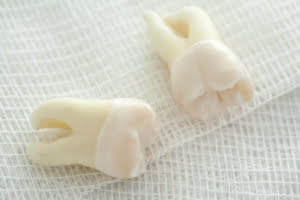
Did you know that nearly 5 million Americans have had their wisdom teeth removed?
The eruption of the wisdom teeth—also known as third molars—can lead to further dental complications like crooked teeth. Other issues include pain and swelling at the jaw, swollen or bleeding gums, bad breath, and problems opening the mouth. Since the third molars sit in the very back of our mouths, they tend to be a little more difficult to keep clean during our daily hygiene routine. This makes them more susceptible to gum disease and tooth decay.
When you visit us at Milford Dental Excellence, we will determine the condition of your wisdom teeth—whether they are fully or partially impacted, how they are affecting the rest of your teeth, and any painful symptoms they are causing you—and we will also take an X-ray for a more accurate examination.
Removing wisdom teeth is a fairly standard procedure. We will provide general anesthesia to minimize the discomfort and, depending on the outcome of the initial assessment, our dentists will remove either one or two of the wisdom teeth or all four.
If you think you are suffering from the effects of wisdom teeth eruption, schedule with our dentists at Milford Dental Excellence today so that we can work with you to design an individual treatment plan.
Patient Testimonial
I’ve been terrified about going to the dentist all my life, but Dr. Reineck and the whole staff at Milford Dental Excellence made my experience as easy going as possible. Everyone was very friendly, helpful, and knowledgeable. They all went above and beyond to make sure I was taken care of and comfortable. I would highly recommend this office!
Additional Information on Wisdom Teeth
Thinking of Getting Your Wisdom Teeth Removed?
Nearly 5 million US citizens have had their wisdom teeth taken out, combining in an annual cost of $3 billion.
You’re probably one of the folks who has undergone this common procedure. If so, a dentist more than likely pulled your wisdom teeth due to the fact that they were disrupting the condition of the rest of your teeth. Our wisdom teeth are the last of our adult teeth to erupt, and they are usually extracted during our teens and early twenties. Some patients’ wisdom teeth emerge without any complications or difficulties. For others, dental problems and painful symptoms go along with the development of these teeth.
A wisdom tooth can be partially or fully impacted. A partially impacted wisdom tooth means that only a portion of the crown is visible, and a fully impacted wisdom tooth means that it has struggled to appear through the patient’s gums. Also, wisdom teeth don’t always grow in straight. They have been known to grow in backward, upside down, or at an angle.
Problems Brought About By Wisdom Teeth
Third molars, also known as impacted wisdom teeth, rupture at the back of the mouth and fail to grow normally because there is no room for them to develop. There are some cases where the third molars do not cause any irritation or ache; however, since these teeth are more difficult to clean, they tend to be more vulnerable to gum disease and tooth decay compared to the other parts of the teeth. Oral surgeons will always extract impacted wisdom teeth that are resulting in issues for the patient, and they will also suggest removing the wisdom teeth that aren’t currently causing pain under the precaution that there will be problems in the future.
What kind of pain is associated with impacted wisdom teeth? Here’s an outline of some symptoms you might suffer from:
▪ Painful gums that swell or bleed
▪ Pain and swelling in the jaw
▪ Problem opening up the mouth
▪ Bad breath
When wisdom teeth grow in, they can cause more damage to the surrounding teeth. Orthodontic treatment might be required if the incoming wisdom teeth move the other molars forward. There is a chance of developing a tumor in the mouth– though it is uncommon– and this occurs because the wisdom tooth can develop in a fluid-filled sac inside the jawbone, causing a cyst to form. If this arises, the oral surgeon could have to take out the neighboring tissue and bone. As stated previously, wisdom teeth are difficult to clean because they reside in the back of the mouth. Along with tooth decay, patients are also at risk of developing an inflammatory gum problem referred to as pericoronitis for these exact reasons.
A Fundamental Operation
The majority of the time, the oral surgeon will get rid of all four wisdom teeth at once, but they might decide to do a few teeth at a time depending upon their or the patient’s decision. The patient will undergo general anesthesia to minimize the amount of irritation they might experience during the process. Depending on the number of teeth that are being taken out, this process can last anywhere from one to several hours. Some of the most common negative side effects of wisdom teeth removal are swelling and bleeding at the surgery site. These may be managed at home with gauze and ice packs, but if these side effects remain, it is wise to talk to the performing surgeon.
Controversy
A few people say that removing wisdom teeth is unneeded and is surely a way for dentists to charge enormous amounts of money to their patients. Jay W. Friedman, DDS, MPH, has published an article elaborating on this position and the misconceptions that go along with the eruption of wisdom teeth in young patients. Needless to say, the option to go forward with wisdom teeth removal or to decide against it is essentially up to the patient. Nevertheless, we recommend that our patients make an educated diagnosis of their pain and discomfort and to talk to our team at Milford Dental Excellence for information and direction when it pertains to diagnosing the intensity of impaction.
To schedule an appointment with us, you can call us at (513)815-3664 or you can schedule online.
